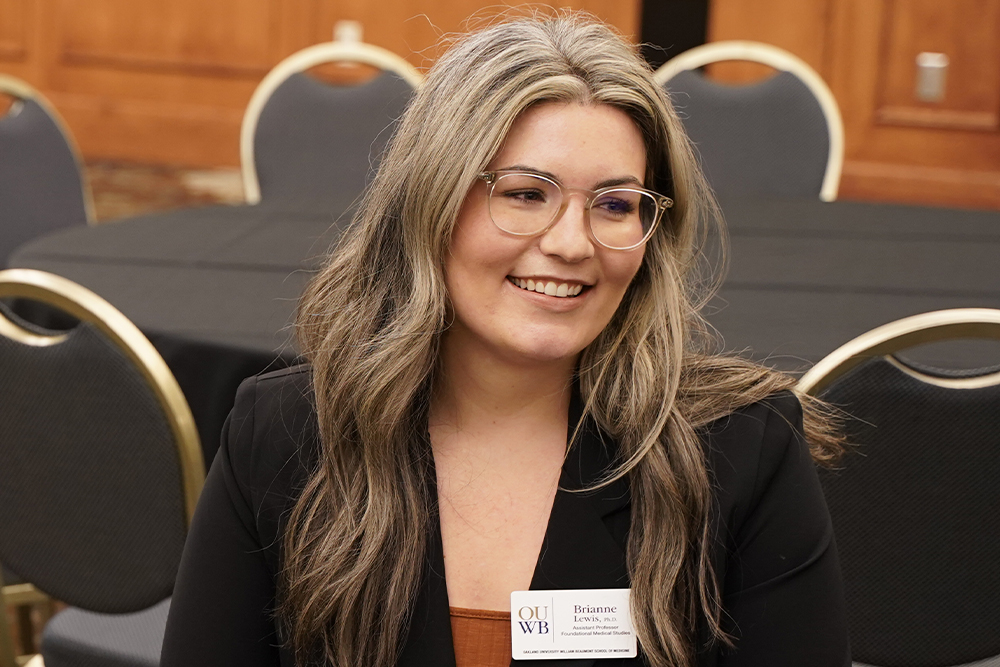
July 2023 marked the two-year anniversary that Brianne Lewis, Ph.D., assistant professor, Department of Foundational Medical Studies, has been working at Oakland University William Beaumont School of Medicine.
In 2021, she came to OUWB after earning her doctoral degree in pharmaceutical sciences from Wayne State University, where she also earned undergraduate degrees in biochemistry and chemical biology. Her research interests include metalloproteins, structural biology, automated insulin delivery systems, and medical education.
Presently, she teaches biochemistry to first-and-second year medical students — but she advances the education of non-medical students as well outside of the classroom. Some of the initiatives she has been involved with to advance learning include the reBUILD Detroit initiative, which aimed to benefit undergraduate students’ education, NIH BEST (Broadening Experiences in Scientific Training) Program, where she focused on developing effective instruction, and OUWB’s bi-annual Online Enrichment Program, which introduces high school students to different aspects of the medical field.
1. What was it that started your interest in biochemistry?
After I took my first biochemistry class, I was hooked! It was the first time I was able to
explore protein structure in great detail. I realized that nearly everything boils down to
biochemistry and I decided I wanted to pursue this field. Later, I studied pharmaceutical
sciences, which in essence, is applied biochemistry. I have always found proteins
fascinating and hope my students feel the same way.
2. You received your B.S. in 2013, making your experience in undergraduate
education relatively close to that of many incoming medical students that you
teach. How do you think this proximity in experience to your students has
impacted the way you teach, if at all?
Even though I received my degree not too long ago, the educational landscape has
changed dramatically. There have been advances in technology and delivery formats
which were not really used prior to the pandemic. Regardless, the feeling of being a
student is still quite fresh. A lot of my own experiences in education as a student have
shaped my teaching philosophy. I try to put myself in the place of my learners and
identify how learning can occur.
3. You collaborated with the reBUILD Detroit initiative to advance representation
in STEM careers by developing research inclusive curriculum for
undergraduate students. Can you tell us more about this initiative and what
inspired you to become involved with this?
I became involved with reBUILD as a graduate student who was seeking out additional
teaching and mentorship opportunities. The project was to create a research project for
undergraduate students who did not have access to larger laboratory research. We
developed a longitudinal research experience which was built in to the general
chemistry lab for freshman students. So, by the end of the class students would have
had exposure to a real research project which could not be accomplished at their home
institution alone. Through this project, I was able to dive more deeply into the inequities
and structural barriers that impede diversification of STEM careers. I am happy to be
continuing my involvement in these projects here at OUWB.
4. You joined OUWB as an assistant professor in the midst of the COVID-19
pandemic. How did you deal with that transition?
Prior to joining OUWB, I had received training about best teaching practices. However,
my training was focused entirely on in-person learning! I had to quickly adjust and learn
new to ways to teach that would still be engaging for students. While this was a
challenge, it was also fun to push myself creatively, and explore new ideas and
technology. Fortunately, I have great colleagues who helped and provided opportunities
to try new things.
5. Can you tell us one thing that people at OUWB probably don’t know
about you?
For my doctoral research, I spent a lot of my time working at a national accelerator (Stanford Synchrotron Radiation Lightsource (SSRL), an extremely bright X-ray beam that allows for high resolution atomic studies). For this reason, my academic family tree goes all the way back to Niels Bohr, Erwin Schrodinger, and Linus Pauling.
To request an interview, visit the OUWB Communications & Marketing webpage.
This work is licensed under a Creative Commons Attribution-NonCommercial 4.0 International License.

